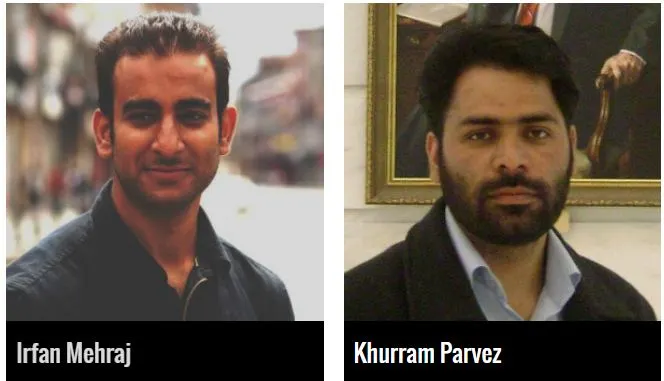The Asian Federation Against Involuntary Disap-pearances (AFAD), Asian Forum for Human Rights and Development (FORUM-ASIA), CIVI-CUS: World Alliance for Citizen Participation, Front Line Defenders and Kashmir Law & Justice Project (KLJP) have urged the representative of G20 member countries, guest countries and international rights organizations to help end human rights violations in Indian illegally occupied Jammu and Kashmir and release rights defenders and political detainees.
The AFAD), FORUM-ASIA), CIVICUS, Front Line Defenders and Kashmir Law & Justice Project (KLJP) in a joint open letter have brought the attention of the G20 member countries, guest countries and international rights organizations towards serious human rights violations, including the unlawful detention and persecution of human rights defenders and journalists, by Indian troops in Jammu and Kashmir.
It said, “As your leaders prepare to attend the G20 Summit in September 2023, we urge your government to raise these issues directly and forthrightly with the government of India in accordance with your obligations under international law and call on India to adhere to its international legal obligations.”
The letter said four years after revoking important constitutional rights and protections for Jammu and Kashmir, the Indian government has continued its repressive policies, including restricting freedom of expression, peaceful assembly and association and failed to investigate and prosecute violations committed by its military, paramilitary, police and other forces. The authorities, it added, have also intensified their crackdown on independent media and civil society groups including through the frequent use of the abusive counterterrorism and state security laws, including the Unlawful Activities (Prevention) Act (UAPA) and Jammu and Kashmir Public Safety Act.
In November 2021, the letter said, India’s infamous National Investigation Agency (NIA) arbitrarily detained and illegally imprisoned prominent human rights defender Khurram Parvez, invoking powers under the UAPA as a reprisal for his human rights work in occupied Jammu and Kashmir.
Khurram is the Program Coordinator of the Jammu and Kashmir Coalition of Civil Society (JKCCS), the Chairperson of the Asian Federation Against Involuntary Disappearances (AFAD). He is also the Deputy Secretary General of the International Federation for Human Rights (FIDH) and in February 2023, he was awarded the prestigious Martin Ennals Award, an annual prize which recognises human rights defenders.
In addition to its persecution targeting Khurram, the NIA is also targeting JKCCS, and anyone associated with the organisation. In March 2023, the UN Special Rapporteur on the situation of human rights defenders, Mary Lawlor, expressed her concern over the targeting of JKCCS and stated that the organisation “carries out essential work monitoring human rights.”
On 20 March 2023, it said, the NIA arrested journalist and human rights defender Irfan Meraj in connection with the JKCCS case. The NIA has publicly stated that one of the grounds for Irfan’s arrest was his close association with Khurram Parvez and JKCCS who were ‘funding terror activities in the valley and propagating secessionist agenda in the Valley under the garb of protection of human rights.’ Both human rights defenders remain illegally imprisoned in the maximum-security Rohini Jail in New Delhi.
Journalists in Kashmir also face extreme levels of harassment by Indian forces, including interrogation, raids, threats, physical assault, restrictions on freedom of movement, and prosecutions under counter-terror laws for their reporting. Among those in detention include Fahad Shah under the UAPA and Sajjad Gul under the PSA.
It said in June 2020, the government announced a new media policy that made it easier for the authorities to censor news in IIOJK. For years, Indian authorities have routinely restricted and blocked the internet in Kashmir and prohibited international journalists, human rights defenders and impartial observers from entering Kashmir, preventing critical reporting of human rights violations in the territory. Kashmir experienced more internet shutdowns and restrictions than any other region in the world again in 2022, with over 49 internet suspensions, it maintained.
Further, the letter said, the usage of travel bans and passport revocations – without providing any explanation – pose an additional barrier to human rights defenders and journalists.
Worryingly, in May 2023, it said, the G20 held a tourism meeting in IIOJK which the UN Special Rapporteur on Minority Issues, Fernand de Varennes, said was being used to “normalise what some have described as a military occupation by instrumentalizing a meeting”. He noted that “the G20 is unwittingly providing a veneer of support to a facade of normalcy at a time when massive human rights violations, illegal and arbitrary arrests, political persecutions, restrictions and even suppression of free media and human rights defenders continue to escalate.”
The Indian government as a party to the International Covenant on Civil and Political Rights (ICCPR) has an obligation to respect and protect fundamental freedoms and ensure a safe and enabling environment for civil society, it maintained.
Further, in 2019, the letter said, the importance of protecting “civic space” was recognized as a term by the Civil 20 – one of the eight official Engagement Groups of the G20 – held in Japan in both the final report and Tokyo Declaration. According to both documents, protecting civic space is necessary to tackle global challenges.
It should be noted that civic space was also present in the C20 in the 2020 and 2021 communique and report.
In addition, the G20 Civic Space Sub-Working Group published a policy brief in July 2022 calling G20 leaders to act to protect and expand civic space. The policy brief points out how civic space is challenged globally by restrictive policies that limit the freedom of association, assembly, expression, and other civil and political rights. The sub-working group concluded that “due to inadequate legal protection that most countries are having, human rights defenders are now at a greater risk of getting hostile retaliation from state and non-state actors when exercising rights to defend public interest.”










